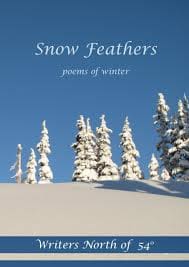Review: Writers North of 54° Chapbooks
Snow Feathers and Skunk Cabbage anthologies from Writers North of 54°
2016 | Contact Harold Fedderson at haroldfeddersen@gmail.com to purchase these chapbooks
poems of winter and renewal
Review by Lesley Strutt
Whatever else we are, Canadians are a nordic people. Our psyche is shaped by our geography. No matter whether we hail from the east or the west coast, the Rockies, the Prairies or the Laurentians, the experience of NORTH is one of our defining characteristics.
Snow Feathers and Skunk Cabbage are two small anthologies by a group of writers who call themselves the Writers North of 54o. The group is located in Terrace, BC and together these writers have written poetry of place that celebrates and bemoans what “north” on this continent means.
 To open Snow Feathers, Solveig Adair spins us round and round in her pantoum “Driving Lessons:”
To open Snow Feathers, Solveig Adair spins us round and round in her pantoum “Driving Lessons:”
In the last days of winter
My grandfather taught me to drive
An island of calm
As I spun across the ice.
How many of us have experienced that slide, the spinning as we careen out of control, ending up, if we are lucky, stalled in a ditch or a snowbank breathing hard realizing this is how it feels to be fully alive? So winter driving lessons become life lessons for a Canadian.
In “Bewitched” Joan Conway captures the perfectly ordinary experience of skating on a frozen lake:
That first winter Lakelse Lake froze
A glistening sheath encasing her black body
in secret realms where reeds and trout dream below
and I in my worn skates scratch scratch
across the surface
with biting cold my cheeks in dusky light.
This private exquisite moment described so precisely. The sense of place so strong that the lake becomes a person, and the skater is made tiny in the vastness of her geography.
Harold Fedderson reminds me of childhood games tunnelling under mounds of snow: “Hiding in the fort / beneath snow that / my brother caves. // My first taste of death / frightens me alive.” Baxter Huston walks along a “cold and frost-damp dream-scape path” and Jesse McCloskey describes “Winter snow stuff. / The little flakey, flowery and icy fellows” as if snow and winter could never be dangerous, or could they? Norma Kerby tells a tale of winter differently in her poem “Broken ski”: “dying is easy in the snow // when you lay down / sweat chills your body then // sleep”. Danger is so close to us in every winter season that it brings us face to face to what few dare to examine. But the beauty in that dangerous landscape is transcendent, as Martha Swan reveals: “~ in the midst of northern winter / we walk the white trails to blue infinity.”
Snow Cabbage: poems of renewal reminds us that what follows winter is the explosion of life. The shockingly pungent aliveness of skunk cabbage – the first flowering plant of spring in northern swamplands, and its bright yellow trumpet-like blooms illuminate the dark – is celebrated. Martha Swan seems to be cursing it: “Low growing, foul, foetid thing / pushing its way through icy muck”. And yet its value to beast and bird cannot be denied. Jesse McCloskey calls it “part prehistoric, / part future (in stamen construction”, “made succulent – to the bear – for proliferation elsewhere.” As harbingers of spring the skunk cabbage has one remarkably disturbing feature – it smells, Norma Kerby tells us, “like rotten meat”. (27) Baxter Huston describes it as “that skanky-rank salad”, and yet it’s a “heavenly meal” for a starving bear. (19)
The importance of skunk cabbage as sustenance is underscored time and again and the reader can feel the urgency of the need for signs of spring after the long winter. Harrold Fedderson gives us a quick sketch in three the short lines of the poem “Swamp Lantern”: “Transluscent yellow cup / holds spikey bulb of / sweet intoxication”. (17) Joan Conway asks “Can I count on you, the first to arrive forceful like a fist? / Grasping, squeezing every last charged particle / when you burst out of fecund mud…/ arrive foul stinking…//…your torch guiding the way.” (7)
These poets illuminate the way for the reader to notice details in our landscapes we might otherwise miss. To balance out the quiet, contemplative poems of winter, these poems of spring nourish us and give us hope as we wait out the long grey days of winter in Canada.
